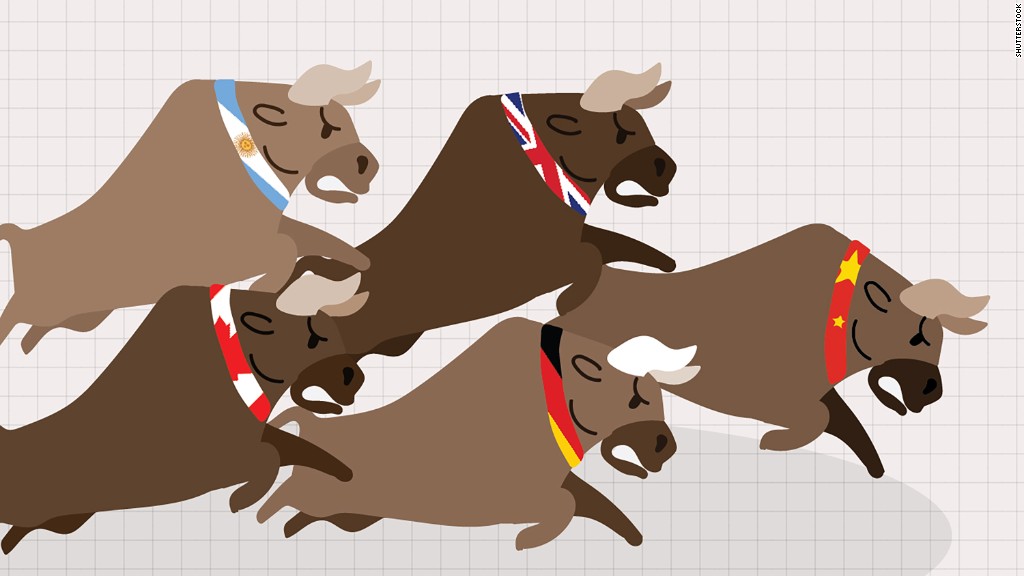
The Dow has soared nearly 2,500 points, or 13%, since Donald Trump was elected president of the United States. And the world's most famous market barometer is up more than 1,000 points, or 5%, in just the past month -- after Trump was inaugurated.
Investors are clearly giddy.
Wall Street is expecting tax reform and an unwinding of Obama era regulations on banks and health care companies under Trump and the Republican-led Congress.
In addition, there are hopes for a massive stimulus package to help rebuild roads, bridges and other infrastructure.
Trump has also met with business leaders from several key industries in the past month and many of those CEOs have all talked about adding jobs in the U.S. in order to further boost the economy.
But are investors ignoring to potential risks? CNNMoney's Fear & Greed Index, which measures seven indicators of sentiment, is now showing signs of Extreme Greed in the market. That could be a sign that the rally may soon end.
Trump may also find that it's not as easy to get things done in Washington as it is when you are running a private company. It could take a lot longer than he'd like to get his economic proposals through Congress, even with a Republican majority.
"Investors have embraced an oversimplified story of tax cuts and less regulation on Trump. That narrative may start to unwind," said Aaron Clark, portfolio manager at GW&K Investment Management.
"It's going to be difficult to get things like repealing and replacing the Affordable Care Act done, for example," Clark added.
And Trump's proposed immigration ban, which may wind up going through a lengthy court battle, could hurt big tech companies that have heavily recruited foreign talent.
Related: Stocks on best winning streak in 25 years
Investors may also grow frustrated if Trump spends more time holding combative press conferences and attacking the media on Twitter instead of doing actual work that would lift the economy.
And there are some big international risks too, particularly in Europe. It's still unclear what long-term impact Brexit will have on the U.K. and the rest of Europe.
Populism is spreading throughout the continent. It's not just Theresa May in Britain. There are concerns that French presidential candidate Marine Le Pen could wind up being the Trump of the eurozone and push France to "Frexit" the EU.
Italy has a new government (again) after Matteo Renzi stepped down late last year. And concerns about Greece's debt load have raised their ugly head again. (Welcome back my friends, to the show that never ends!)
This is all happening as bond rates in the U.S. are continuing to rise and the Federal Reserve is set to raise interest rates several more times this year. Higher rates could take a bite out of any stimulus from the Trump administration.
"I'm very surprised by how the stock market has reacted," said Mary Ann Hurley, vice president of fixed income trading at D.A. Davidson & Co. "Frankly, the bond market does not believe the stimulus hype."
"If it were that simple to create growth, it would have happened already in Japan and Europe," she said. "Talk is cheap. And I'm concerned about rising interest rates and worried about the protectionism and populism in Europe."
Related: Here's why Trump hasn't killed the bull market
Some strategists are worried about the rise of protectionism in the United States.
Trump quickly moved to kill the President Obama-backed Trans-Pacific Partnership. He also has had tough words with Mexico, Japan, China and Germany about their currencies and exports.
"I'm very worried about Trump's trade policy," said Shannon Saccocia, head of asset allocation at Boston Private Wealth. "The risk is that China winds up replacing the U.S. as a big trading partner for other nations."
"If there's a vacuum in leadership, China could fill it," Saccocia added.
Despite these numerous risks, the market has continued to chug higher.
That might not be a problem if stocks were cheap. But they're not.
John Butters at FactSet Research points out that the S&P 500 is now trading at about 17.6 times earnings estimates for the next 12 months. That's its highest valuation since 2004.
Related: Is Trump the reason for the bull market? Or Janet Yellen?
Simply put, investors are betting that absolutely nothing will go wrong in the global economy over the next few months.
That seems unlikely given the concerns about Europe and the U.S. -- as well as the fact that China's economy is cooling off, India has had a hiccup due to the elimination of some of its paper currencies and Japan remains stagnant.
Humberto Garcia, head of global asset allocation for Leumi Investment Services, fears that investors are way too optimistic.
"The market has a lot of euphoria baked into it," Garcia said. "After the election, I said animal spirits were dancing. They're dervishes now."


